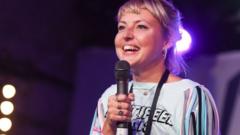7 minutes ago
About sharing
Kris Hallenga, founder of breast cancer awareness charity CoppaFeel!, has died at the age of 38.
She was diagnosed with terminal breast cancer 15 years ago.
That grim news inspired her to offer support to other young people in a similar position.
Confirming her death, CoppaFeel! said: “She approached life in a wildly creative, fun and fearless way, and showed us that it is possible to live life to the full with cancer.”
Hallenga was diagnosed with cancer in 2009, when she was in her early 20s – after being turned away from GP help for more than a year, her charity says.
By then, the disease was terminal.
She was determined the disease was not seen as something affecting only older women. Through her charity, she fought to raise awareness of breast cancer in young people.
CoppaFeel!’s mission became to educate young people about why they should start checking from a younger age so that all breast cancer is diagnosed early.
In a statement on its website, the charity said: “She hasn’t lost a battle, she wasn’t in a fight and she certainly wouldn’t want you to see her death as tragic.”
It added that she had died “with fulfilment and a heart full of love”.
Alongside her philanthropic work, Hallenga was also a columnist at The Sun.
In 2014, a documentary about her life and work – Kris: Dying to Live – was aired on BBC Three.
Last year, she held a living funeral, attended by celebrities including Dawn French, at Truro Catherdral.
The charity said on Monday that Hallenga’s family has requested privacy.
It added: “Please remember the amazing life Kris led and the things she achieved, but above all else honour her memory by checking your chest… it could just save your life.”
‘My meaning in life’
Hallenga was determined that other young people should be trained to spot the early warning signs of the disease and check their breasts regularly.
A month after her diagnosis, Hallenga set up a charity called CoppaFeel! with her twin sister, Maren, to help raise awareness at schools and music festivals about the importance of early diagnosis.
In a BBC interview in 2014, Hallenga said that young women who have been diagnosed late after an emergency referral often contacted her for advice and support. She said she had come to see herself as a voice for those going through the same thing.
“Cancer has given me a life and given meaning to what I do with my life,” she said.
In England, Scotland and Northern Ireland, cancer treatment should start within 62 days of an urgent referral by a GP.
But only 61% of patients in England are currently starting treatment in that time – against a target of 85% – and in Northern Ireland, just 37%.
The charity Breast Cancer Now says significant progress has been made on breast cancer research over the decades but it is “not a done deal”.
It estimates that 11,500 people a year in the UK die from the disease.
If you have been affected by issues raised in this article you can visit the BBC Action Line pages.
19 January 2019
25 March 2014
